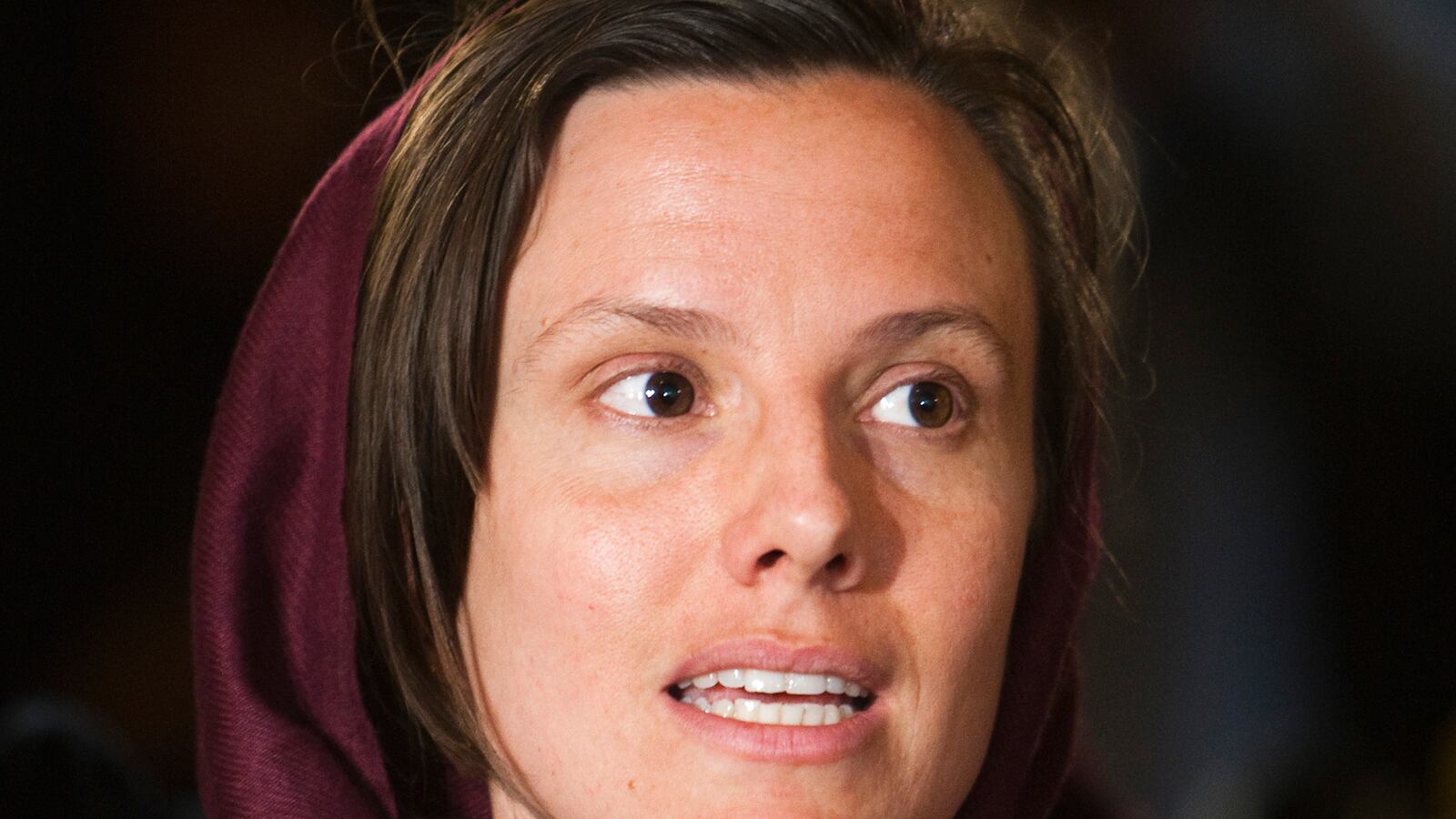Yesterday President Obama told CBS News reporter Major Garrett that he should “know better” during a news conference.
The journalist had asked if the president felt “content” to celebrate the new nuclear deal with Iran while three—possibly four—Americans were still being held hostage there.
“That’s nonsense,” Obama replied. “You should know better.”
“This nuclear deal meets the national-security interests of the United States and our allies,” he continued. “It prevents the most serious threat of Iran obtaining a nuclear weapon… that’s why this deal makes our country safer and secure.”
It flashed me back to May 19, 2010.
For hours I’d been crouched on the floor of my cell devouring what for almost a year had been my only source of information from the outside world—the English ticker quickly moving across the bottom of my TV screen during the nightly news hour of the Islamic Republic of Iran News Network (IRINN).
That night Turkish, Brazilian, and Iranian leaders announced the success of the Tehran Declaration—a deal in which Iran agreed to ship 1.2 tons of low-enriched uranium to Turkey for a later exchange of 120 kilograms of enriched isotope for its medical nuclear reactor in Tehran. It was a huge breakthrough in long-stalled negotiations.
I danced in my cell.
Then, within hours, still glued to my TV, I read that the United States had rejected the deal, revealing that it would press ahead with new sanctions against Iran.
Obama, I thought, should have known better.
At that point, I knew little to nothing about the negotiations for my release, but I felt certain that my freedom—if and when it came—would be calibrated precisely in response to the temperature of unfolding U.S-Iranian relations.
About four months later I was suddenly released, after 410 days as a political hostage held in incommunicado, solitary detention in Iran without trial.
An envoy of the Sultan of Oman picked me up in his private plane and flew me back to his country. Nothing had been given in exchange for my release, he said, but if I wanted my fiancé Shane Bauer and friend Josh Fattal to get out, I would have to help him convince my government extend some small gesture of “good will.”
Now I didn’t merely have a hunch that our imprisonment was tied up in larger issues—I knew it.
For me, the question is not whether the fate of the remaining American hostages—Jason Rezaian, Amir Hekmati, Saeed Abedini and perhaps Robert Levinson (whose whereabouts are still unknown)—is tied to larger geo-political issues, it’s what should we do about it.
Of course their fate is tied to decades of animosity between our governments: That’s why the Iranian government continues to hold them.
After my release from prison, I was at the center of the international campaign for the release of Shane and Josh. I worked closely with diplomats from Oman, Venezuela, Iraq, and the United States.
Throughout that year, before their release, I heard numerous times from foreign diplomats that my government wasn't acting decisively—or even that it was making our situation worse by refusing to engage, even indirectly, with the Iranian government.
Then, in the summer of 2010, my husband and friend were released. Almost immediately, American former-marine Amir Hekmati was arrested. Four years later, he’s still in prison.
This was not coincidence. For the Iranian government, imprisoning Americans provides an important kind of security, like money in the bank—a bargaining chip they have to use as leverage.
When a hostage has been held too long, he or she decreases in value. When the pressure and condemnation of the Iranian government reach a critical point, they become more trouble than they are worth. That’s how people get released.
“Defiance chips” are cashed in for “humanitarian points.”
It doesn’t matter who they are or what they stand for, American hostages can be used to assert pressure. So, when one is released, soon someone else is picked up. It’s a revolving door.
So, no, it wasn’t a “nonsense question” that a CBS reporter asked President Obama yesterday, but it wasn’t an easy question either. It’s a question that still hasn’t been satisfied.
In 2013, we reached another juncture when a U.S./Iran nuclear deal felt very close. Around that time the Associated Press reported that it was a series of secret talks between high-level U.S. and Iranian officials—facilitated and hosted by the Sultan of Oman—that paved the road for the historic agreement over Iran's nuclear program.
According to these reports, it was the Omani-led negotiations to free Josh, Shane, and me from prison that generated sufficient trust between nations, and put the sultan in a position to help end the U.S.-Iran stalemate.
“Ironically,” said the AP report, “efforts to win the release of the three American hikers turned out to be instrumental in making the clandestine diplomacy possible.”
At times I felt grateful to Oman for tying us into the larger negotiations—for tying us in to any negotiations—rather than just letting us rot in prison while the U.S. government waited the Iranian government out.
At other times I was skeptical. I realized that the United States and Iranian government might be stalling precisely because our case was tied up with the nuclear deal. Neither could afford to look weak.
What our government needs to do, I told myself, is the right thing. They need to make a deal.
Five years later, earlier this week, that’s exactly what’s happened.
And it’s a good deal. It will lessen tension between governments, weaken the hard-liners’ position in Iran and maybe even lead to cooperation that helps slow the terrifying spread of ISIS throughout the region.
Though the domestic situation might not change much—political oppositionists like Mousavi and Karroubi will likely remain in interminable house arrest, and political activists will be imprisoned and tortured—at least after decades of being strangled by sanctions, ordinary Iranians will have a little more room to breathe.
Would that explanation be enough for Jason Rezaian, Amir Hekmati, Saeed Abedini, Robert Levinson, and their families?
I don’t know.
I do know that until U.S./Iranian relations are normalized, there will continue to be incentive for the Iranian government to hold more Americans hostage. This deal decreases the utility of that tactic.
Should U.S. officials have demanded the release of Americans before they signed a nuclear deal?
Yes, of course.
Did they try? Probably.
People in Iran are celebrating in the streets right now—and Americans should be too.
This deal makes it more feasible that countless Iranian-Americans that have been critical of the Islamic Republic may someday be able to visit their loved ones in Iran without fear of imprisonment.
That someday—maybe even in my lifetime—ex-political prisoners, dissidents and former hostages like myself might also be able to step foot on Iranian soil without fear of being scooped up, imprisoned, stripped of our rights and psychologically tortured.
That would truly be a cause for celebration.
I’d like to return to an empty Evin prison someday—in the heart of Tehran—to the very cell where I was held. I’d run through its halls without a blindfold on. I’d visit the tiny cell where my husband and friend were held for over two years.
I’d bring large vats of paint, sledgehammers and many friends. Together, we’d paint the walls until there wasn’t a speck of dirty white left.
Then we’d tear down the roof. We’d let in the sun.






